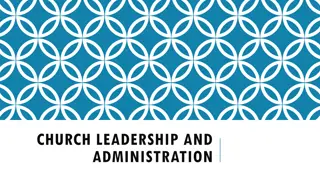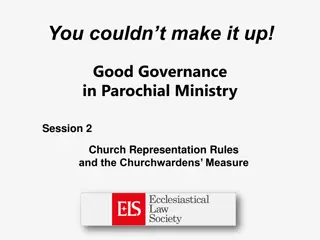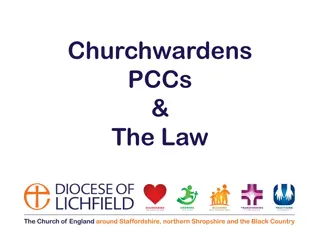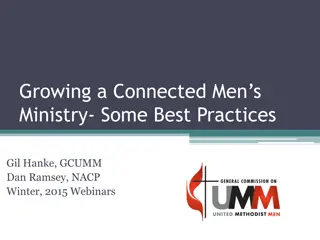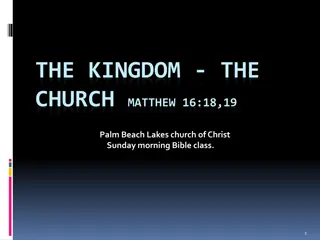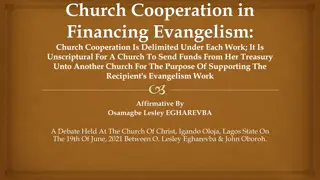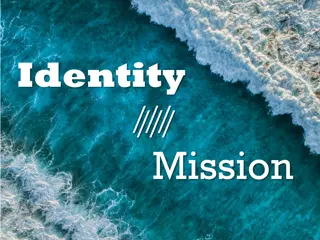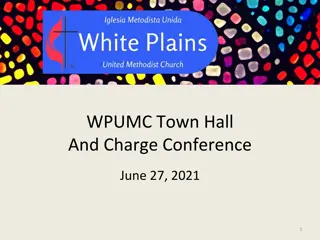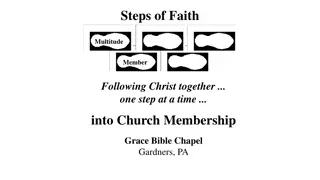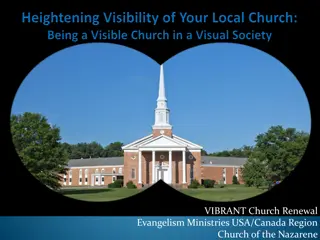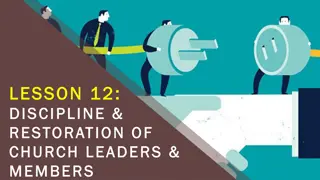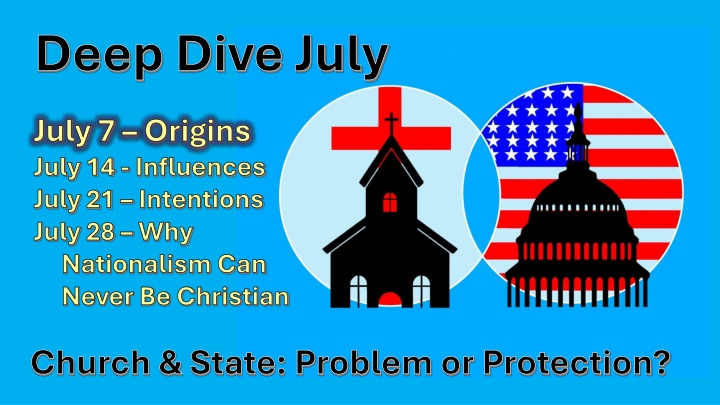
Religion, Government, and Authority: Insights from Romans 13:1-7
Delve into the relationship between religion, earthly government, and individual conscience as outlined in Romans 13:1-7. Explore the implications of governing authorities being appointed by God and the dynamic between obedience and conscience in the context of state authority. Unpack the idea of government authorities as God's servants and the significance of this perspective in the present day.
Download Presentation

Please find below an Image/Link to download the presentation.
The content on the website is provided AS IS for your information and personal use only. It may not be sold, licensed, or shared on other websites without obtaining consent from the author. If you encounter any issues during the download, it is possible that the publisher has removed the file from their server.
You are allowed to download the files provided on this website for personal or commercial use, subject to the condition that they are used lawfully. All files are the property of their respective owners.
The content on the website is provided AS IS for your information and personal use only. It may not be sold, licensed, or shared on other websites without obtaining consent from the author.
E N D
Presentation Transcript
Deep Dive July July 7 Origins July 14 - Influences July 21 Intentions July 28 Why Nationalism Can Never Be Christian Church & State: Problem or Protection?
Origins How Do Religion and Earthly Government Relate? Romans 13:1-7 1Let every person be subject to the governing authorities; for there is no authority except from God, and those authorities that exist have been instituted by God. What do you see as the implications of such a statement in scripture?
Origins How Do Religion and Earthly Government Relate? Romans 13:1-7 2Therefore whoever resists authority resists what God has appointed, and those who resist will incur judgement. How do you feel about the idea that our elected leaders are appointed by God?
Origins How Do Religion and Earthly Government Relate? Romans 13:1-7 3For rulers are not a terror to good conduct, but to bad. Do you wish to have no fear of the authority? Then do what is good, and you will receive its approval; How would you explain this comment, given that it is completely out of character for Paul and his view of Roman empire?
Origins How Do Religion and Earthly Government Relate? Romans 13:1-7 4for it is God s servant for your good. But if you do what is wrong, you should be afraid, for the authority does not bear the sword in vain! It is the servant of God to execute wrath on the wrongdoer. What questions do you have about the difference between then (Paul s time) and now (our time)?
Origins How Do Religion and Earthly Government Relate? Romans 13:1-7 5Therefore one must be subject, not only because of wrath but also because of conscience. What role does conscience ( /syne disi, literally with ideals/values ) play in our relationship to state/government/empire?
Origins How Do Religion and Earthly Government Relate? Romans 13:1-7 6For the same reason you also pay tribute (taxes), for the authorities are God s servants, busy with this very thing. What does Paul really mean when he says that government authorities are God s servants?
Origins How Do Religion and Earthly Government Relate? Romans 13:1-7 7Pay to all what is due to them taxes to whom taxes are due, revenue to whom revenue is due, respect to whom respect is due, honor to whom honor is due. The keys to unlocking Paul s meaning are three: 1)context, 2)communalism, and 3)kosmos. Authorities are plural, not singular, and the are temporal.
Deep Dive July July 7 Origins July 14 - Influences July 21 Intentions July 28 Why Nationalism Can Never Be Christian Church & State: Problem or Protection?
Developmental Cultural Process Trans- Rational Rational Mythic Magic Causal
Influences Religion and Politics Through the Ages, Around the World Egypt 16th to 11th centuries BCE Early Assyrian ( c. 2600 2025 BCE), Old Assyrian ( c. 2025 1364 BCE), Middle Assyrian ( c. 1363 912 BCE), Neo-Assyrian (911 609 BCE) and post-imperial (609 BCE c. 240 CE) Jerusalem First Temple Period (c. 1200 BCE 586 BCE) Jerusalem Second Temple Period (538 BCE 70 CE)
Influences Religion and Politics Through the Ages, Around the World Alexandrian Age (371 BCE 290 BCE) Roman Empire (unified 27 BCE 395 CE, Western 395 CE 476 CE, Eastern 395 CE 1453 CE) Ottoman Empire (c. 1299 CE 1922 CE) British Empire (c. 1497 CE 1914/1945 CE) United States of America (1776 CE ??? CE)
Deep Dive July July 7 Origins July 14 - Influences July 21 Intentions July 28 Why Nationalism Can Never Be Christian Church & State: Problem or Protection?
Intentions What Did the Founding Fathers Mean to Create? The happiness of the people was the purpose of government, he wrote, and therefore that form of government was best which produced the greatest amount of happiness for the largest number. And since all sober inquirers after truth agreed that happiness derived from virtue, that form of government with virtue as its foundation was more likely than any other to promote the general happiness. McCullough, David. John Adams (p. 121). Simon & Schuster. Kindle Edition.
Intentions What Did the Founding Fathers Mean to Create? The vast majority of the Founding Fathers were republicans, not democrats, which is to say that they had rejected monarchy and hereditary rule and they had embraced unequivocally the idea of representative government. Beeman, Richard. Plain, Honest Men: The Making of the American Constitution (p. 8). Random House Publishing Group. Kindle Edition.
Intentions What Did the Founding Fathers Mean to Create? Americans began to argue about how their Constitution should be interpreted from the very moment that the new government under that Constitution commenced. Beeman, Richard. Plain, Honest Men: The Making of the American Constitution (p. 9). Random House Publishing Group. Kindle Edition.
Intentions What Did the Founding Fathers Mean to Create? In point of fact, the document produced that summer is remarkably secular. While the other great American founding document, the Declaration of Independence, begins with the invocation of the Laws of Nature and of Nature's God and concludes with an appeal to a firm Reliance on the Protection of divine Providence, the only substantive mention of religion in the body of the Constitution is aimed quite explicitly at separating religion and government. Beeman, Richard. Plain, Honest Men: The Making of the American Constitution (p. 260). Random House Publishing Group. Kindle Edition.
Intentions What Did the Founding Fathers Mean to Create? They believed that they were creating a republic, not a democracy, and most of the wealthy and privileged men serving in the Convention were convinced that true republican government depended on a virtuous, property-owning citizenry. Beeman, Richard. Plain, Honest Men: The Making of the American Constitution (p. 398). Random House Publishing Group. Kindle Edition.
Intentions What Did the Founding Fathers Mean to Create? Religion and humanity had nothing to do with the question. Interest alone is the governing principle with nations. John Rutledge Beeman, Richard. Plain, Honest Men: The Making of the American Constitution (p. 451). Random House Publishing Group. Kindle Edition.
Intentions What Did the Founding Fathers Mean to Create? Franklin observed that whenever you assemble a number of men to have the advantage of their joint wisdom, you inevitably assemble with those men all their prejudices, their passions, their errors of opinion, their local interests, and their selfish views. From such an assembly can a perfect production be expected? Beeman, Richard. Plain, Honest Men: The Making of the American Constitution (p. 505). Random House Publishing Group. Kindle Edition.
Intentions What Did the Founding Fathers Mean to Create? Franklin acknowledged there were several parts of this Constitution which I do not at present approve, but, he added, the older I grow the more apt I am to doubt my own judgment and pay more respect to the judgment of others. Beeman, Richard. Plain, Honest Men: The Making of the American Constitution (p. 505). Random House Publishing Group. Kindle Edition.
Intentions What Did the Founding Fathers Mean to Create? the Constitution has had a fair trial and that there had not been any undue influence exercised to obtain the vote in its favor; that many doubts which lay on his mind had been removed, and that, although he was in the minority, he should support the Constitution as cheerfully and as heartily as though he had voted on the other side of the question. Beeman, Richard. Plain, Honest Men: The Making of the American Constitution (p. 547). Random House Publishing Group. Kindle Edition. Benjamin Swain
Intentions What Did the Founding Fathers Mean to Create? Madison's close friend and political ally, Thomas Jefferson, was of a different temperament. In a remarkable letter written to Madison just before he returned from France in 1789, Jefferson took up the question of whether one generation of men has a right to bind another. Jefferson answered in the negative. The earth belongs to the living; the dead have neither power nor right over it. Applying that belief to the durability and immutability of constitutions, Jefferson asserted that no society can make a perpetual constitution or perpetual law. The earth belongs always to the living generation. They may manage it then, and what proceeds from it, as they please. Beeman, Richard. Plain, Honest Men: The Making of the American Constitution (p. 586). Random House Publishing Group. Kindle Edition.
Intentions What Did the Founding Fathers Mean to Create? Some men, Jefferson noted, look at constitutions with sanctimonious reverence, and deem them like the ark of the covenant, too sacred to be touched. They ascribe to the men of the preceding age a wisdom more than human, suppose what they did to be beyond amendment. I knew that age well; I belonged to it, and labored with it. It deserved well of its country. But I know, also that laws and institutions must go hand and hand with the progress of the human mind. As that becomes more developed, more enlightened, as new discoveries are made, new truths disclosed, and manners and opinions change with the change of circumstances, institutions must advance also, and keep pace with the times. Beeman, Richard. Plain, Honest Men: The Making of the American Constitution (p. 586). Random House Publishing Group. Kindle Edition.
Intentions What Did the Founding Fathers Mean to Create? The First Amendment of the Constitution of the United States of America Congress shall make no law respecting an establishment of religion(1) or prohibiting the free exercise thereof(2); or abridging the freedom of speech(3), or of the press(4); or the right of the people peaceably to assemble(5), and to petition the Government for a redress of grievances(6).
Intentions What Did the Founding Fathers Mean to Create? Congress shall make no law respecting an establishment of religion(1) or prohibiting the free exercise thereof(2); or abridging the freedom of speech(3), or of the press(4); or the right of the people peaceably to assemble(5), and to petition the Government for a redress of grievances(6). 1. Why are these specific items bundled together? 2. What happens when we pull them apart, essentially making them separate amendments? 3. Why do we tend to interpret these as protection of individual rights?
Intentions What Did the Founding Fathers Mean to Create? The Good freedom to worship as one chooses, draw from multiple systems, fosters civility and respect. The Bad based primarily on Judeo- Protestant values with little or no regard for other faiths, interpreted by white, male, elite. The Ugly thinly veiled protection against Roman Catholics, Jews, and anti- intellectual Methodist & Baptist upstarts. The Good The Ugly The Bad
Deep Dive July July 7 Origins July 14 - Influences July 21 Intentions July 28 Why Nationalism Can Never Be Christian Church & State: Problem or Protection?
Why American Nationalism Can NEVER Be Christian How does the lens affect how we see the world? How does it impact our definitions of truth, justice, mercy & peace? Core Values Faith or Politics
Why American Nationalism Can NEVER Be Christian Nationalism Exceptionalism Achievement/Acquisition Judgment & punishment Inwardly focused Law-based Violence/power-based Moralistic Fundamentalist Christianity Humility Equity Mercy & redemption Outwardly focused Grace-based Peace/partner-based Ethical Inclusive
Why American Nationalism Can NEVER Be Christian The ironic claim of Christian nationalism As a nation, we must demand of our elected leaders the highest moral values and integrity: Obedience to God, fidelity in marriage, sanctity of life, impeccable character, honesty, law-abiding, fair to all. At present there is only one candidate who had proven himself deserving of our support. Yoram Hazony, evangelical



